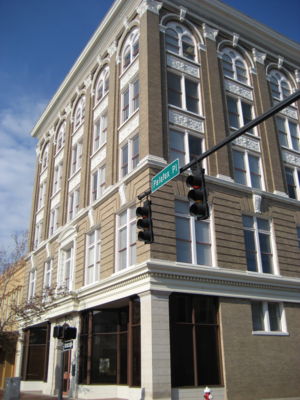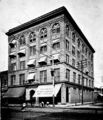Difference between revisions of "Thiesen Building"
(+ image) |
m |
||
| Line 16: | Line 16: | ||
|style=Renaissance Revival | |style=Renaissance Revival | ||
|size=five stories | |size=five stories | ||
| − | |mapcode= | + | |mapcode= |
| − | |||
| − | |||
}} | }} | ||
The [[Thiesen Building]] is Pensacola's first commercial high-rise. At the time of its construction in 1901, this five-story building was the tallest building in Pensacola and the first with a modern elevator and steam heat. Built in a Renaissance Revival style, it features terra-cotta ornamentation on the west and south facades. | The [[Thiesen Building]] is Pensacola's first commercial high-rise. At the time of its construction in 1901, this five-story building was the tallest building in Pensacola and the first with a modern elevator and steam heat. Built in a Renaissance Revival style, it features terra-cotta ornamentation on the west and south facades. | ||
Latest revision as of 06:24, 8 February 2017
| Thiesen Building | |
 The Thiesen Building | |
| Building Information | |
|---|---|
| Location | 40 S. Palafox Street |
| Architect | Morgan and Dillion |
| Client | Christen Thiesen |
| Engineer | Wills and Broughton |
| Current Owner | Ray Russenberger |
| Construction Start Date | 1901 |
| Completion Date | 1902 |
| Renovations | 1993-1996 |
| Style | Renaissance Revival |
| Size | five stories |
The Thiesen Building is Pensacola's first commercial high-rise. At the time of its construction in 1901, this five-story building was the tallest building in Pensacola and the first with a modern elevator and steam heat. Built in a Renaissance Revival style, it features terra-cotta ornamentation on the west and south facades.
It was conceived, financed, and owned by Danish businessman Christen Thiesen, who was reportedly warned that his venture would fail and the building would be lost to receivership. Thiesen responded by vowing to fly the Danish flag from the building each April 1st as a symbol of his continued ownership. It is said that Thiesen raised the Danish flag every April 1st until his death in 1934. The building was added to the National Register of Historic Places in December, 1979.
By the 1970s, the building had fallen into disrepair and had become vacant. In 1992 businessman Ray Russenberger purchased the building to provide offices for his paging company Network USA. He restored the exterior to its original 1901 design. The work was done by the architectural firm of Spencer, Maxwell, and Bullock, and by the Greenhut Construction Company.
